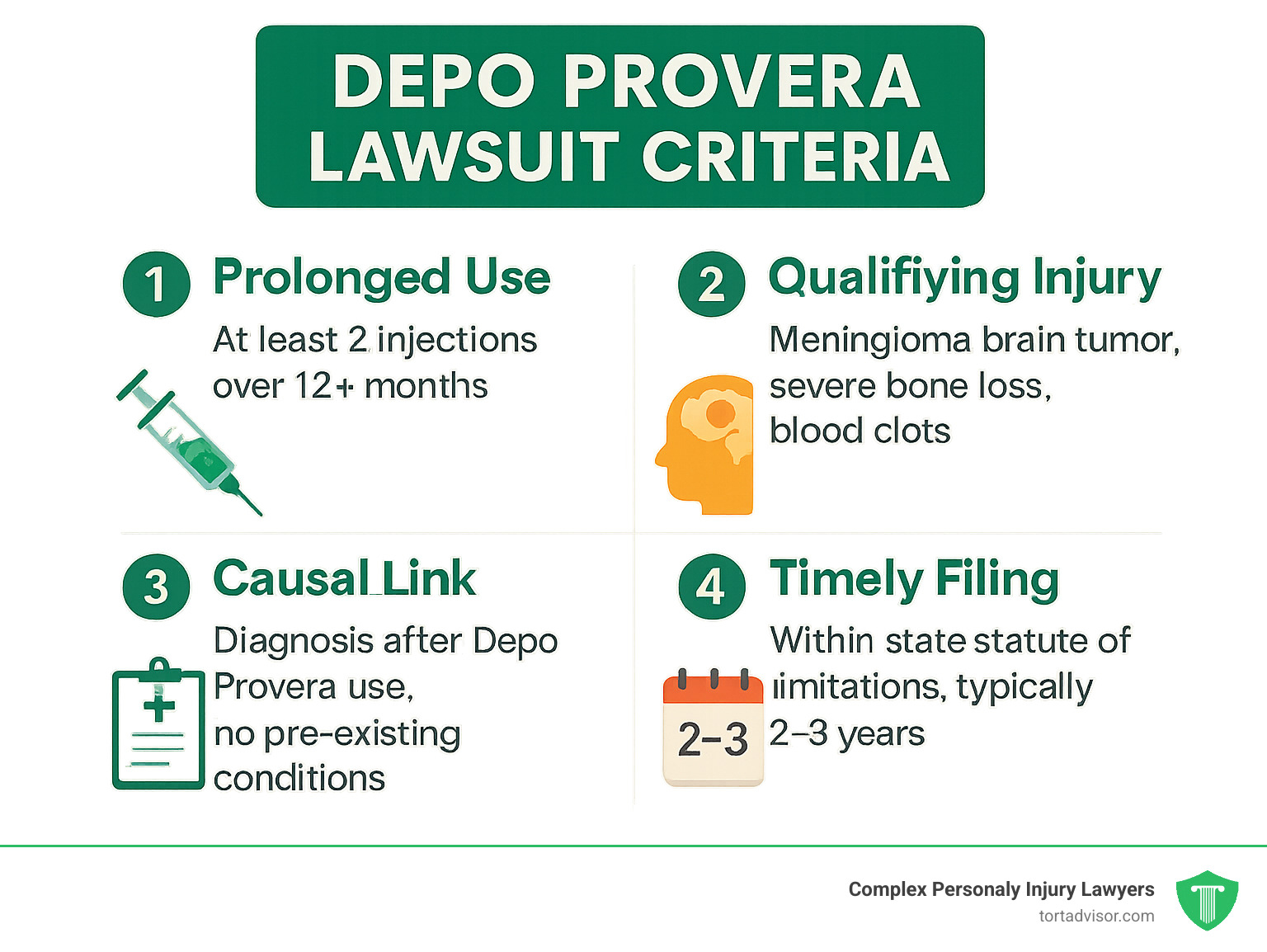


Understanding Your Eligibility for Legal Action
Depo Provera lawsuit criteria are a critical concern for women who developed serious health issues after using this birth control injection. With hundreds of cases in federal multidistrict litigation and scientific evidence linking Depo-Provera to brain tumors, many are asking: “Do I qualify for legal action?”
Key Depo Provera Lawsuit Criteria:
- Prolonged Use – At least 2 injections over 12+ months
- Qualifying Injury – Meningioma brain tumor, severe bone loss, or other serious conditions
- Causal Link – Diagnosis occurred after starting Depo-Provera with no pre-existing conditions
- Timely Filing – Case filed within your state’s statute of limitations (typically 2-3 years)
Recent studies in The BMJ found women using Depo-Provera for over a year faced a 5.6-fold increased risk of developing meningiomas, a type of brain tumor. Despite this, Pfizer added meningioma warnings to European and Canadian packaging in 2022 but failed to update U.S. labels, forming the basis for failure-to-warn lawsuits.
The legal landscape is evolving rapidly. As of July 2025, 435 active cases are pending before Judge M. Casey Rodgers in Florida’s federal court, an 87-case increase in one month. Settlement predictions range from $150,000 to over $1.5 million depending on injury severity.
I’m Mason Arnao. Through my work in data management and lead generation, I’ve connected thousands of individuals with legal resources for complex cases like Depo Provera lawsuits. My experience with legal data provides deep insight into how these cases are built and what documentation is crucial.
Depo Provera lawsuit criteria word guide:
The Core Depo Provera Lawsuit Criteria: A Four-Point Checklist
Think of pursuing a Depo-Provera lawsuit like following a recipe – you need the right ingredients to get the result you’re looking for. The good news? The Depo Provera lawsuit criteria aren’t as complicated as they might seem.
These cases center on one main issue: Pfizer’s alleged failure to warn American women about serious health risks, particularly the connection to brain tumors called meningiomas. While the company updated warning labels in Europe and Canada in 2022, U.S. labels remained unchanged—and that’s what these lawsuits are challenging.
The federal courts have taken notice. Hundreds of cases have been consolidated into a Multidistrict Litigation (MDL) in Florida, which is legal-speak for handling many similar cases together.
Let’s walk through the four key criteria that determine whether you might have a viable legal claim.
Criterion 1: History of Depo-Provera Use
The foundation of any Depo-Provera lawsuit is having used the drug. Eligibility isn’t based on a single shot; it typically requires prolonged use—at least one year of consistent treatment with multiple injections.
Since Depo-Provera is given every three months, a year of use means you received at least four shots. The longer you used it, the stronger your potential case becomes. This extended timeline matters because it takes time for certain injuries, particularly meningiomas, to develop.
You might still qualify even if you used a generic version of medroxyprogesterone acetate. Thanks to a concept called innovator liability, Pfizer can still be held responsible for generic versions.
The logic is that generic manufacturers must copy the brand-name warning label. If Pfizer’s label lacked proper warnings, they can be held liable even if you used a generic version. Some authorized generics may also qualify, though specifics can vary by state.
Criterion 2: Diagnosis of a Qualifying Injury
Not every health problem will qualify for a Depo-Provera lawsuit. The legal focus is on specific, serious conditions that research has linked to the drug. The primary qualifying injury is meningioma, a type of brain tumor that is the cornerstone of most current litigation.
Meningiomas are tumors in the protective membranes around the brain and spinal cord. Though often non-cancerous, they can cause severe symptoms and require major surgery. The evidence here is strong: scientific research published in The BMJ found that women using the shot for over a year faced a 5.6-fold increased risk of developing these tumors.
Severe bone density loss and osteoporosis are another category of qualifying injuries. While bone loss is a known side effect, cases involving severe, life-altering bone damage may qualify.
Pseudotumor cerebri (also called IIH) is another potential qualifier. This condition mimics a brain tumor by causing increased pressure around the brain, leading to severe headaches and vision problems.
Some cases also involve blood clots like deep vein thrombosis or pulmonary embolism, though these are less common in the current litigation.
For more detailed information about the connection between Depo-Provera and brain tumors, check out our comprehensive guide on Depo Shot Brain Tumor.
Criterion 3: Establishing a Link Between Use and Injury
Having used Depo-Provera and later developing a qualifying injury isn’t enough. You must prove causation—that the drug caused or significantly contributed to your health problems.
This means your diagnosis should have occurred after starting Depo-Provera. The timeline is critical. If you were diagnosed with a meningioma before using the shot, you won’t have a viable claim.
Legal teams use medical expert opinion from specialists like neurologists and oncologists to establish this connection. These experts analyze your medical history, the timeline of events, and scientific literature to build a case.
One crucial factor is ruling out other causes. For meningioma cases, it strengthens your claim if you have no family history of meningiomas or other brain tumors, as this helps eliminate genetic predisposition as an alternative cause.
The goal is to show that Depo-Provera was the most likely culprit, not just a coincidence.
Criterion 4: Filing Within the Legal Timeframe (Statute of Limitations)
Time is critical in legal action. Every state has statutes of limitations, which are firm deadlines for filing lawsuits. If you miss this deadline, you permanently lose your right to sue.
These state-specific deadlines typically range from one to six years. Most states follow the discovery rule, which means the countdown begins when you discovered your injury or reasonably should have discovered the connection between your injury and the drug.
When the clock starts ticking can be tricky. For example, if you were diagnosed with a meningioma in 2023 but only learned of its potential link to Depo-Provera in 2024, the statute of limitations might not start until 2024 in some states.
The importance of acting quickly cannot be overstated. Laws are complex, so protecting your legal rights means consulting an attorney promptly to understand your specific deadline and preserve your opportunity for justice.
The ongoing federal MDL provides streamlined processes, but only if you act before your state’s deadline expires. Don’t let time run out on your chance to hold Pfizer accountable.
Gathering Your Evidence: What You Need to Build a Strong Case
So, you’ve reviewed the Depo Provera lawsuit criteria and feel you might have a case. Now it’s time to gather the ammunition for your claim. Building a strong case is like assembling a puzzle – every piece of evidence helps complete the picture of how Depo-Provera impacted your life.
Pharmaceutical companies have deep pockets and legal teams who will scrutinize every detail. That’s why rock-solid documentation is your best defense. Your evidence must tell two clear stories: that you used Depo-Provera and suffered a qualifying injury, and that this injury significantly damaged your life in measurable ways.
Essential Medical and Pharmacy Records
Your medical and pharmacy records are the foundation of your case. Without them, proving you used Depo-Provera and developed a related health condition is nearly impossible. Here’s what you need to gather.
Prescription history and pharmacy receipts are gold. These documents show when and how often you received Depo-Provera injections, directly addressing the first of our Depo Provera lawsuit criteria. Most pharmacies keep digital records going back years.
Doctor’s notes from your healthcare providers paint a complete picture of your medical journey, detailing symptoms, diagnoses, and treatment plans.
If diagnosed with a meningioma, neurologist reports are crucial. Reports from neurologists, neurosurgeons, and oncologists provide details about your tumor’s size, location, grade, and its impact on your daily life.
Imaging results like MRI and CT scans serve as visual proof of your condition, clearly demonstrating the tumor’s presence and characteristics.
For tumor cases, pathology reports confirm your diagnosis beyond doubt, providing critical information about the tumor’s nature.
Don’t forget treatment records. Documentation of surgeries, radiation, or other interventions shows the extent of medical care you’ve needed.
Even if you don’t have these documents, you have a legal right to obtain them under HIPAA. The Department of Health and Human Services provides guidance on how to get your medical records. An experienced attorney can also help you request these vital records from healthcare providers.
Documenting Your Damages
Proving you were injured is only half the battle. The other half is showing exactly how that injury has impacted your life financially and emotionally. This is where documenting your damages is critical.
Medical bills are the most straightforward damage. Keep track of every expense related to your diagnosis and treatment, including doctor visits, hospital stays, surgeries, and medications.
Future medical costs can be staggering. For serious conditions like meningiomas, you may face decades of monitoring and follow-up treatments. Attorneys work with medical experts to estimate these long-term costs.
Lost wages and diminished earning capacity are another major category. Document any missed work or reduced ability to earn income. This includes not just past losses but also how your injury might limit your future earning potential.
Pain and suffering is harder to quantify but is often the largest component of compensation. It covers physical pain and emotional distress. Keeping a daily journal detailing your symptoms and emotional struggles can be powerful evidence. Document everything from headaches to anxiety—it all matters.
Other out-of-pocket expenses can include travel for medical appointments, home modifications, or assistive devices.
Our comprehensive Depo Provera Settlement Amounts Lawsuit Guide provides detailed insight into the damages you might recover and what factors influence settlement amounts.
Gathering this evidence isn’t just busy work; it’s building the case that could secure your financial future and hold Pfizer accountable.
Common Disqualifiers: What Might Prevent You From Filing?
Not everyone who used Depo-Provera and suffered an injury will qualify for compensation. It’s important to understand the factors that could prevent you from meeting the Depo Provera lawsuit criteria. These are the potential roadblocks that could stop a claim before it starts.
Understanding these potential roadblocks helps set realistic expectations. Sometimes, the most honest approach is explaining why a case might not succeed.
Pre-Existing Conditions and Alternative Causes
The biggest challenge is proving the drug caused your injury. Diagnosis before Depo-Provera use is the most clear-cut disqualifier. If medical records show you had a qualifying condition before your first injection, establishing causation is nearly impossible.
Family history of tumors can complicate a case. While not an automatic disqualifier, a strong genetic predisposition can weaken your claim. Defense attorneys may argue genetics caused your condition, not Depo-Provera, making the legal path more challenging.
Concurrent use of other hormonal contraceptives creates a “causation problem.” If you used other hormonal treatments alongside Depo-Provera, it becomes difficult to pinpoint which medication caused your injury.
Unrelated injuries that fall outside the scope of recognized Depo-Provera complications won’t qualify. An attorney cannot create a medical connection that doesn’t exist.
Missing the Statute of Limitations
Timing is everything, and this is where many potential claimants lose their opportunity. Expired deadlines are unforgiving. Once your state’s statute of limitations passes, courts will dismiss your case, regardless of its merit.
Failure to act in time often happens because people don’t immediately connect their health problems to Depo-Provera. While the “discovery rule” can sometimes extend deadlines, relying on it is risky.
The harsh reality is that forfeiting your right to sue due to missed deadlines is common. This is why we urge people to seek legal consultation as soon as they suspect a connection.
Insufficient Evidence of Use or Injury
Evidence is the foundation of any lawsuit. Lack of medical records is a common problem, especially for those who used Depo-Provera years ago. If you can’t prove you received the injections, building a case is extremely difficult.
Inability to prove Depo-Provera use through prescription records or medical notes creates an impossible obstacle. You must provide concrete proof to challenge a pharmaceutical company.
A vague diagnosis is insufficient for pharmaceutical litigation. General complaints like headaches, without a specific diagnosis supported by imaging and specialist reports, will not meet the court’s requirements for a precise, documented medical condition.
No clear link to the drug can derail a case even with evidence of both use and injury. If medical experts can’t establish a plausible connection, or if other more likely causes exist, your case may not survive legal scrutiny.
Frequently Asked Questions about Depo Provera Lawsuit Criteria
Let’s face it – legal stuff can be confusing, and you probably have a dozen questions swirling around in your head about Depo Provera lawsuit criteria. We get it! These are some of the most common questions we hear from people just like you who are trying to figure out if they have a case.
What if I used the generic version of the Depo shot?
Here’s some potentially good news that might surprise you! Even if you used a generic version of the Depo shot, you may still be eligible to file a lawsuit against Pfizer, the brand-name manufacturer. This works under a legal concept called “innovator liability.”
Think of it this way: when generic drug companies make their version of a medication, they’re required to copy the exact warning label from the original brand-name drug. So if Pfizer failed to adequately warn about serious risks like meningiomas on their Depo-Provera label, they could still be held responsible even if you used the generic version.
This principle has been successfully applied in courts, particularly in states like California. However, innovator liability laws vary by state, so it’s important to have an experienced attorney evaluate whether this applies to your specific situation and location.
How much does it cost to hire a lawyer for a Depo Provera case?
This is probably one of the first things you’re wondering about, right? The great news is that pursuing a Depo-Provera case won’t cost you a penny upfront.
Most personal injury law firms that handle Depo Provera lawsuit criteria cases work on what’s called a contingency fee basis. This means you pay absolutely nothing to get started – no consultation fees, no retainer, no hourly charges. The attorney’s fee comes as a percentage of whatever compensation they recover for you.
Here’s the best part: if your lawyer doesn’t win your case, you don’t pay them anything for their time. It’s that simple. This system was designed specifically so that everyone has access to quality legal representation, regardless of their financial situation. You shouldn’t have to choose between seeking justice and paying your bills.
What is the current status of the Depo Provera litigation?
The Depo-Provera litigation is very much alive and growing stronger every month. As of 2025, hundreds of lawsuits have been filed in federal courts across the country, and these numbers keep climbing as more women find the connection between their injuries and Depo-Provera use.
All of these federal cases have been consolidated into something called a multidistrict litigation, or MDL for short. The Depo-Provera Products Liability Litigation, MDL 3140, is being handled in the Northern District of Florida under Judge M. Casey Rodgers.
The growth has been remarkable – as of July 2025, there were 435 active cases pending in the MDL, which represents a significant jump from the 289 cases reported just two months earlier in May. This consolidation is actually good news for plaintiffs because it streamlines the legal process, reduces costs, and allows cases to move more efficiently through the court system.
What does this mean for you? It means you’re not alone, and there’s strength in numbers. The ongoing litigation demonstrates that courts are taking these claims seriously, and the legal framework is already in place to handle new cases efficiently.
Your Next Steps: How to Pursue a Claim
If you believe your situation matches the Depo Provera lawsuit criteria, know that you are not alone. The most important first step is educating yourself about your rights.
The path forward doesn’t have to be overwhelming. While we’ve outlined the necessary ingredients (evidence) and criteria (eligibility), you don’t have to steer this process alone.
Your most crucial next move is seeking a legal consultation. This isn’t about making a commitment; it’s about having an experienced attorney review your unique situation. They’ll assess your medical records, timeline, and give you an honest assessment of where you stand.
During this consultation, an attorney will walk through the four key criteria: your history of Depo-Provera use, your qualifying injury, the causal link, and whether you’re within the legal timeframe to file. They’ll help you understand what evidence you might still need and how strong your case might be.
Time is genuinely of the essence. The statute of limitations deadlines are hard stops. The longer you wait, the closer you get to losing your right to seek compensation. With the ongoing multidistrict litigation gaining momentum, joining the existing legal framework can work in your favor.
Tort Advisor connects people like you with top-rated attorneys specializing in these cases. We work exclusively with legal professionals who have proven track records in pharmaceutical litigation and understand the Depo Provera lawsuit criteria. Our attorneys can steer the complex MDL process and have the resources to challenge major pharmaceutical companies like Pfizer.
Here’s what makes this easier than you might think: Most attorneys handling these cases work on a contingency fee basis, meaning you pay nothing upfront. They only get paid if they win your case. This levels the playing field and ensures you can pursue justice.
The manufacturers need to be held accountable when they fail to warn consumers about serious health risks. Your case is about your compensation and ensuring other women receive proper warnings.
Don’t let the legal system’s complexity intimidate you. Every successful case started with someone taking that first step. At worst, you’ll find out you don’t have a case, but you will have answers and won’t spend years wondering “what if.”
Ready to get the answers you deserve? Let’s connect you with an attorney who can review your situation and help you understand your options.
Free Confidential Case Evaluation
Complete the short form below to get an immediate FREE case review with an expert in your specific claim. Don't wait, your case could be time sensitive to file a claim.
Related Posts
Did a North Dakota product cause harm? Understand product liability, your rights, and how to take action for defects.
Get justice for clergy abuse. Find an expert Priest abuse lawyer to navigate complex laws and hold institutions accountable.
Diagnosed with meningioma after Depo-Provera? Understand potential Depo-Provera lawsuit settlements, risks, & how to claim compensation.
Uncover the truth about uber sexual assault cases. Learn about the alarming scale, Uber's accountability, and legal options for justice.
Facing wildfire losses? Discover the best wildfire lawsuit attorneys in California to fight for your full recovery and justice.
Exposed to Roundup & diagnosed with NHL? Discover how to sue Monsanto, understand eligibility, & seek compensation. Your guide to justice.









